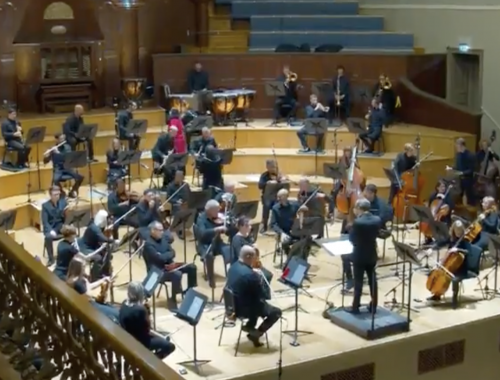Is Drama Just All Fun and Games?
Initially, I felt nervous, suddenly very aware of my lack of Drama knowledge and admittedly, intimidated by the exuberant confidence I associated with Drama teachers…
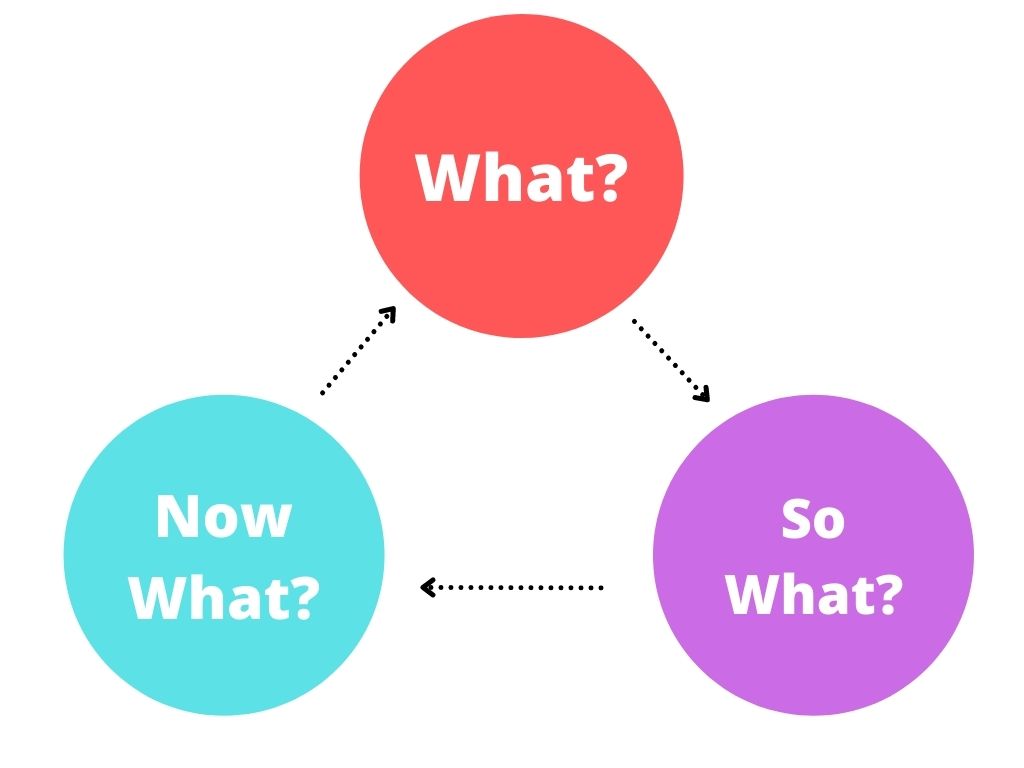
This blog reflects on my placement experiences in Bangor Academy and Sixth Form College, using Borton’s Reflective Model, as reflective practice is necessary in personal growth and “critical in supporting and maintaining professional development” (Cartwright and McGregor, xvi), especially in initial teacher training.
As an English student, who has never studied Drama, being offered the chance to gain experience in the Drama department at Bangor Academy was an invaluable opportunity, but it didn’t start off as all fun and games…

I adopted the role of a nervous student, entering the Drama department with stiff posture and sweaty palms, which was drastically contrasted by the greeting of the bubbly, enthusiastic Drama teacher who I would be spending two periods a week with, so I breathed a sigh of relief!
As I spent the first few weeks of Drama with Year 9 observing from the side-lines, my uncertainty of how these lessons would look in comparison to English lessons was clarified, and I realised the main difference was a lot of games (and not a lot of written work), which the students seemed to love!
Does a practical lesson mean a less educational one? At first, I wasn’t so sure, but when I had the opportunity to lead an opening game for the class, over time, I changed my mind…
Why play games in the classroom? Are they a helpful way to learn, or simply a time-waster?
“drama games have been proven to boost confidence, encourage collaborative skills, develop creative thinking, increase analytical and problem-solving skills and promote literacy… [developing] a respectful and supportive classroom environment.”
The Knowledge Network for Innovations in Learning and Teaching (KNILT)
After 7 weeks of placement, I have learnt from experience that I agree with those at KNILT. Having seen pupils’ confidence grow and creativity thrive, I can firmly say that learning through practical experience is a massively helpful way to educate. As for what I learnt from the games we played…
- Buzzy Bees – Encourages students to act using their whole body, challenging them to think creatively, acting out a unique subject, achieving the objectives of Physical Theatre in a fun and engaging way.
- Wink Murder – Students must act out an over-dramatic death using sound effects, when winked at by the ‘murderer’, stimulating interest around aspects of Melodrama, covered in the Year 9 course.
- The Keys Game – Creeping silently around the group, deciding what movement would be the most effective in retrieving the keys from under the chair encourages students to use their whole body in an action, as observed in Physical Theatre.
Each of these Drama games developed acting skills, as lesson openers for the Year 9 Physical Theatre Unit.
Goldilocks and the Three Bears… Unbearable?
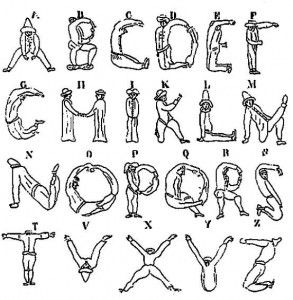
Class activities completed over numerous weeks, such as The Human Alphabet (Fig. 3), acting as a machine, as household objects and furniture, and writing scripts for scenes based on personal events, to act out in the form of Physical Theatre, have developed skills for the Christmas Assessment, where each group of students acts out the Goldilocks poem (Fig. 4).
In class, students were allocated groups and read through the poem, choosing their roles. The teacher emphasised that the focus should be on furniture and the physical ‘prop-like’ aspects of the story, with less focus on the characters of Goldilocks or the three bears.
In our double lesson this week, the students were set one half of the poem, working only on stanzas one and two. However, if I were to lead this lesson myself, if the situation arose again, I would allow students to work on stanzas three and four as well, as some groups finished quickly in the double period and lost focus once they had practiced their scenes a few times.
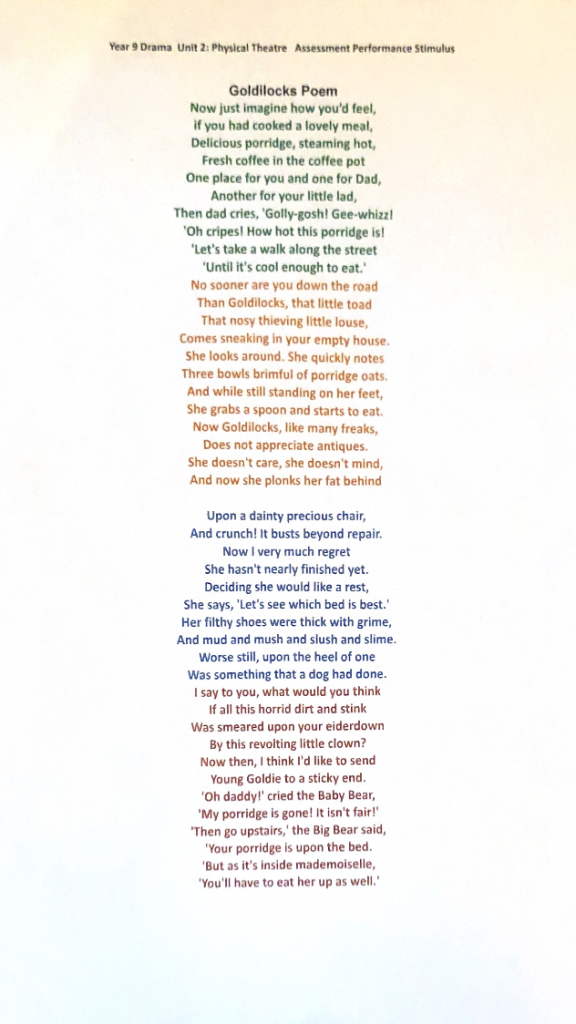

Overall, my experience with the Drama department has been extremely positive so far, apart from having little prior knowledge to share with the students, other than that of plays I have studied previously in English. But, as I heard a teacher tell one of the students: “It’s okay if you don’t understand everything at first, learning is a journey… it would be a very short one if you knew everything already!”
So, after nearly one term at my placement school, I have learnt a lot about Physical Theatre, how to act as a machine, furniture, that at times, Goldilocks can be unbearable… and that playing games is actually a very effective method of teaching, as it engages students with the curriculum, promoting active learning! Most importantly, I have learnt that even as a student teacher, it’s normal to feel nervous about new experiences and learning new things you don’t know much about – we are lifelong students after all! In the future, I would channel this into a more positive outlook on new challenges, as already, in my placement, I have gained invaluable experience in an area that, as a prospective English teacher, I will likely encounter. As the year goes on, I want to continue to educate myself further on Drama as a subject, so that I am prepared if I am ever faced with teaching Drama alongside English, as a teacher in the future.
So, is Drama just all fun and games?
Not necessarily… but games certainly add an extra layer of fun to Drama class!
Bibliography
- Fellows, Luke. “Drama Games as a Teaching Strategy.” KNILT, 12 July 2020, knilt.arcc.albany.edu/Drama_Games_as_a_Teaching_Strategy.
- McGregor, Debra, and Lesley Cartwright. Developing Reflective Practice: A Guide for Beginning Teachers. McGraw-Hill Education, 2011.
- Sparrow, Phoebe. “What Is Physical Theatre?” City Academy, 12 May 2021, https://www.city-academy.com/news/what-is-physical-theatre/.
- “What is Physical Theatre? | English Literature – The Curious Incident of the Dog in the Night-time.” YouTube, uploaded by BBC Teach, 22 Apr. 2016, www.youtube.com/watch?v=P_HfdiC7tZU&feature=youtu.be. (Accessed on 21st November 2021).
♫ Jumping into JAM! ♫
A new opportunity!
You May Also Like
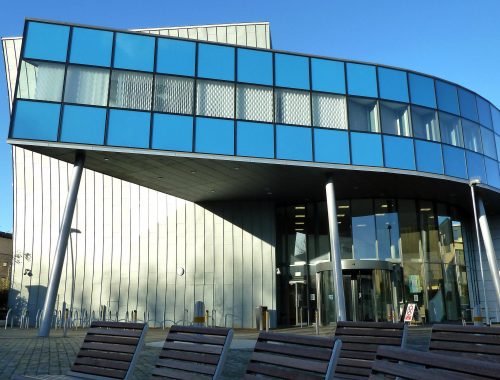
Roles Reversed
26 November 2021
Learning from experience- Am I on the right track?
28 November 2021